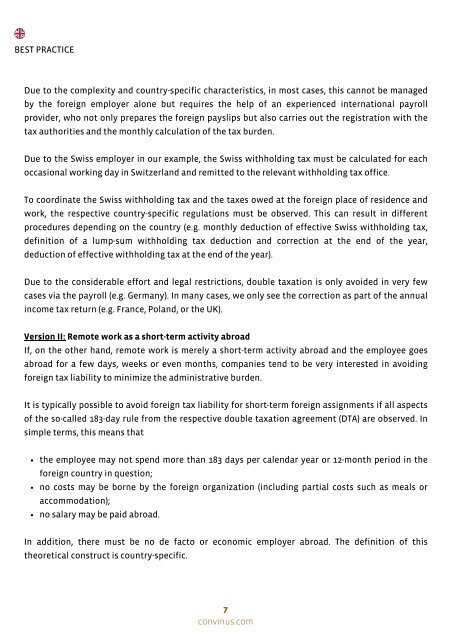CONVINUS Global Mobility Alert - Week 7.2024
You also want an ePaper? Increase the reach of your titles
YUMPU automatically turns print PDFs into web optimized ePapers that Google loves.
BEST PRACTICE<br />
Due to the complexity and country-specific characteristics, in most cases, this cannot be managed<br />
by the foreign employer alone but requires the help of an experienced international payroll<br />
provider, who not only prepares the foreign payslips but also carries out the registration with the<br />
tax authorities and the monthly calculation of the tax burden.<br />
Due to the Swiss employer in our example, the Swiss withholding tax must be calculated for each<br />
occasional working day in Switzerland and remitted to the relevant withholding tax office.<br />
To coordinate the Swiss withholding tax and the taxes owed at the foreign place of residence and<br />
work, the respective country-specific regulations must be observed. This can result in different<br />
procedures depending on the country (e.g. monthly deduction of effective Swiss withholding tax,<br />
definition of a lump-sum withholding tax deduction and correction at the end of the year,<br />
deduction of effective withholding tax at the end of the year).<br />
Due to the considerable effort and legal restrictions, double taxation is only avoided in very few<br />
cases via the payroll (e.g. Germany). In many cases, we only see the correction as part of the annual<br />
income tax return (e.g. France, Poland, or the UK).<br />
Version II: Remote work as a short-term activity abroad<br />
If, on the other hand, remote work is merely a short-term activity abroad and the employee goes<br />
abroad for a few days, weeks or even months, companies tend to be very interested in avoiding<br />
foreign tax liability to minimize the administrative burden.<br />
It is typically possible to avoid foreign tax liability for short-term foreign assignments if all aspects<br />
of the so-called 183-day rule from the respective double taxation agreement (DTA) are observed. In<br />
simple terms, this means that<br />
the employee may not spend more than 183 days per calendar year or 12-month period in the<br />
foreign country in question;<br />
no costs may be borne by the foreign organization (including partial costs such as meals or<br />
accommodation);<br />
no salary may be paid abroad.<br />
In addition, there must be no de facto or economic employer abroad. The definition of this<br />
theoretical construct is country-specific.<br />
7<br />
convinus.com


















